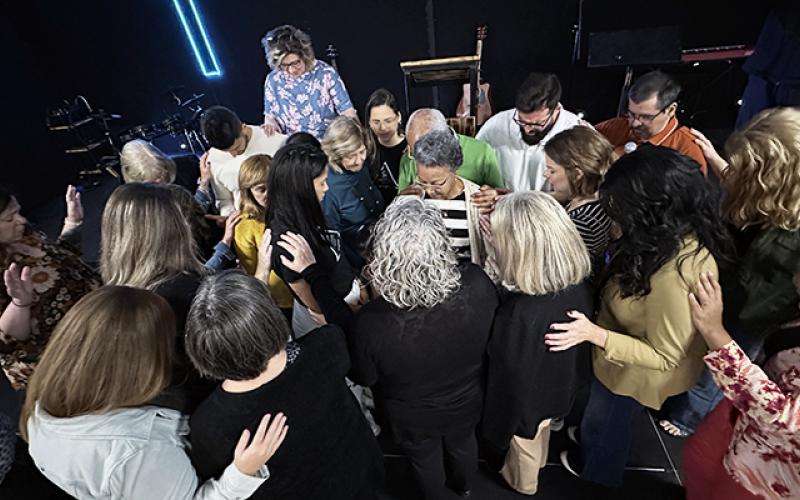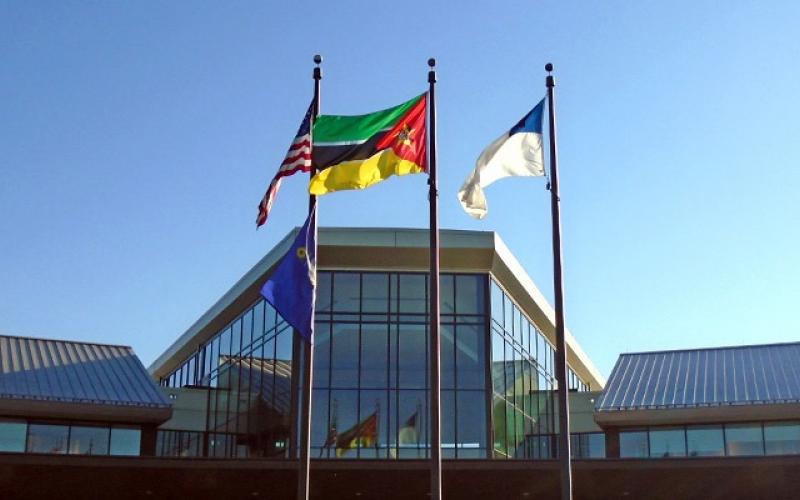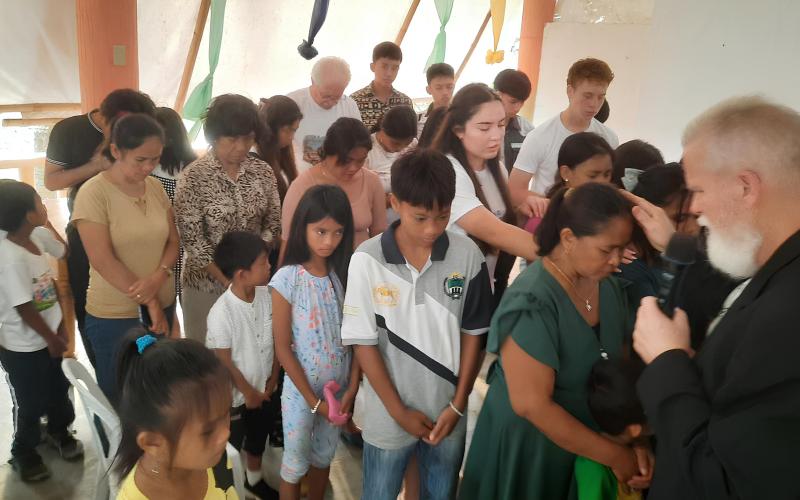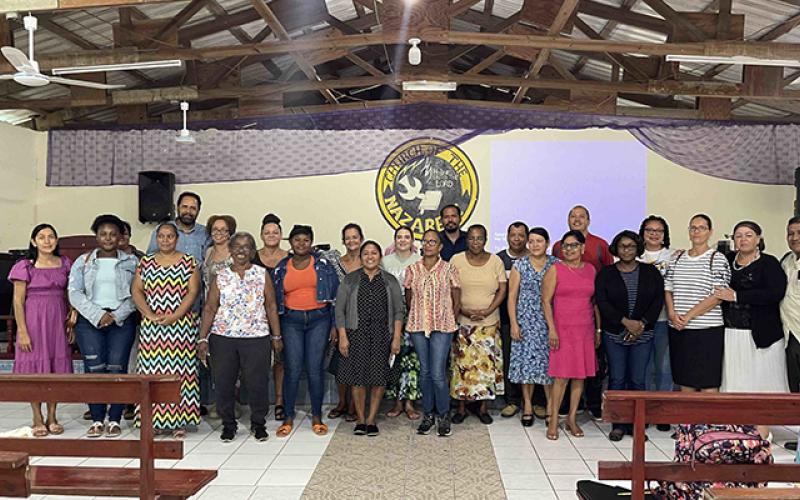
A Haven of peace: A day in the life of Nazarene Evangelical School

It’s a school unlike any I have ever seen.
Take, for instance, math class. For many kids worldwide, math is quite possibly the most boring subject ever invented. But math can be loads of fun! One day, the kids of grade 4 walk up the stairs with huge rulers and set squares to practice measurements; the next day they fill up self-made, one-cubic-centimetre boxes with water at the taps outside to explore the concept of volume. Meanwhile, grade 5 is enjoying pieces of watermelon to internalize the mathematics of fractions.
 Or English grammar? Like “pulling teeth?” Not here. When the 27-year-old dean of students comes to class dressed up as an old man character and tells stories “from when he was young” to introduce the past simple tense, grammar may turn out to be everyone’s favourite subject.
Or English grammar? Like “pulling teeth?” Not here. When the 27-year-old dean of students comes to class dressed up as an old man character and tells stories “from when he was young” to introduce the past simple tense, grammar may turn out to be everyone’s favourite subject.
Creative teaching methods are complemented with educational field trips to explore ideas outside the classroom and learn, not just for school, but for life. Like grade 5 going to the mall to learn about prices. Or grade 9 taking food to a home for young drug addicts to learn both about the dangers of drug abuse as well as the value of ministering to others.
“Learning” is not just an activity at this school, a necessary precursor to passing exams. Learning is a lifestyle, an adventure, a privilege to be enjoyed.
What school, then, is this? A posh institution offering Montessori-type education to middle or upper-class kids in an affluent U.S. suburb, with well-equipped, comfortable classrooms, wide green spaces to play in, the newest technology, advanced learning tools and teachers with Harvard degrees?
Not so. It's a small school of 200 students in a busy, cramped, low-income neighbourhood just north of Beirut, the capital of Lebanon. Most of the classrooms are tiny, dark, and unbearably hot in the summer. There's some technology, but several rooms still use chalkboards. The school has a small computer and science lab and a modest library, but no gymnasium or sports ground, and the school bell is actually a bell that has to be rung manually. The schoolyard is impossibly small, giving only just enough space for grades 1 to 9 to play and take a rest outside before they return to their classrooms.

For 51 years, the Nazarene Evangelical School in Sin-el-Fil has been serving its community, and for 51 years, the teachers and staff have not permitted outward circumstances to deter them from giving their best to the children who call this school home.
In so doing, they have created a haven of peace in a world of turmoil. Through 15 years of civil war, they kept the school running. Through decades of religious violence and mistrust, they have built up a place where children of all religions and denominations study peacefully side by side. This is particularly significant at a time when the tiny country of Lebanon is bursting at its seams with refugees. Until 2005, the nation had been occupied by Syrian troops, and only six years later, Syrian civilians started arriving in the wake of their civil war. Many Lebanese grumble angrily against having to give refuge to their former oppressors. But in the midst of all this resentment and hatred, the NES is able to provide a space where all kids are equal and equally loved and valued.
Children from a dozen different ethnicities and almost as many religious affiliations study at the NES. Some were persecuted in their home countries. Others belong to families who left home voluntarily in search for work and a better life. Some lost everything or had to watch loved ones die. Others have grown up in sheltered middle-class families. And some live in orphanages because their parents can’t give them a home.
But when you watch them in the school, it is impossible to tell who is who because these differences don’t matter here. Every child is integrated into the NES family – those children, too, who were not accepted anywhere else.
And that is what you notice when you visit the school. It’s not the cramped classrooms or the tiny schoolyard, not the lack of state-of-the-art laboratories or a gymnasium. It’s the atmosphere of love and mutual respect, the way the teachers and children create community and accept and care for each other, no matter what. In April 2017, I have the privilege to witness this for myself. And it is unlike any school I’ve ever seen.
Talking to and watching the teachers, I can tell how much they care about these kids and invest time and effort to make their lessons creative. They try to be a friend, not just an educator. That in itself may not be unique – I have met many teachers who taught not as a job, but as a vocation. But there’s something different here, and I notice it in the way the kids respond to the teachers with affection, friendship and trust.

During the watermelon lesson in grade 5, Mrs. Claude, the math teacher, starts pulling her desk to the centre of the room, and immediately, four guys jump up to lend a hand – 10-year-old boys, falling over each other in their eagerness to help their teacher! A minute later, two girls get up to assist Mrs. Claude in covering her desk in cling wrap. And when the watermelon-fractions are distributed, those that didn't get to help before are happy it's finally their turn.
“It’s a privilege to them to be allowed to help a teacher,” Nabil Habiby, dean of students at NES, explains later.
But what impresses me most is watching the kids during recess time. With approximately 150 children playing in one tiny, concrete-floored schoolyard – the three kindergarten grades have their own playground upstairs – you'd think there'd be several casualties every recess. But there are not – “because the kids take care of each other,” as Marlene Mshantaf, principal of NES, tells me.
I can see a seventh grader bend down to tie the shoe of a first grader. Two girls from different grades arm-in-arm, weaving in and out of the throng to be in nobody's way. A fifth-grade guy deep in conversation with a teacher, and several sixth-grade girls having a chat with second-grade boys. I watch an eighth-grade boy, engrossed in the basketball match, throw himself after the ball to keep it from hitting some third graders.
Wherever I gaze, I see evidence that this is not just a school, but a family, a home.



